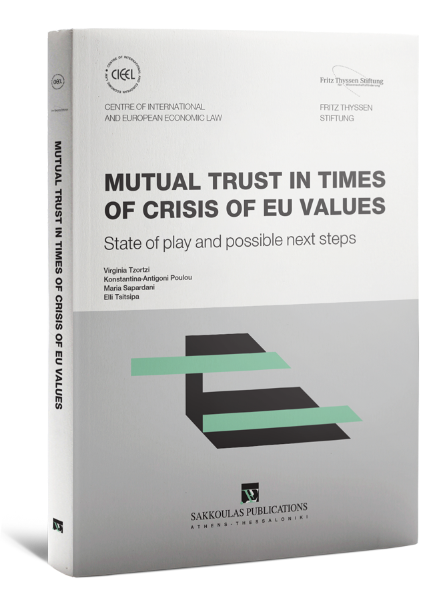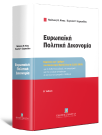Centre of International and European Economic Law/Fritz Thyssen Stiftung, Mutual trust in times of crisis of EU values, 2021

The theory that Europe is deeply divided over the understanding of fundamental values calls inevitably for the questioning of the core principles of the European constitutionalism and the maintenance of mutual trust between the EU Member States in the sensitive fields of criminal and asylum law. The unpleasant examples of the rule of law crisis in Poland and Hungary are now followed by the examples of Bulgaria and Romania and confirm the view that the “contagious disease” of backsliding remains a daunting challenge. How should the EU react to the effects of institutional rupture and systematic shortages in order to re-establish mutual trust and confidence in the Area of Freedom, Security and Justice? This book focuses on the balance between understanding and applying the principle of mutual trust as “blind trust” or “mutual suspicion” among the EU Member States in the new era of backsliding. In light of the recent legislative reforms in Bulgaria and Romania, the structural foundations of the EU at stake are put under the microscope. The authors provide a critical overview of the existing EU toolbox against the rule of law crisis and suggest a series of realistic improvements as regards particularly the case in Bulgaria and Romania. The book concludes with proposals of the authors as to the future steps of the EU on its difficult way towards European integration in times of a polycrisis.
Πληροφορίες έκδοσης
Πίνακας περιεχομένων +-
Contents
Acknowledgements
Abstract
List of abbreviations
Executive summary
1. Introduction
2. The structural foundations of the EU at stake
2.1. The evolution of the principles of mutual trust and mutual recognition
2.1.1. Mutual trust and mutual recognition in the internal market
2.1.2. Mutual trust and mutual recognition in the Area of Freedom, Security and Justice
2.1.2.1. Introductory remarks
2.1.2.2. Judicial cooperation in criminal matters
2.1.2.3. The Dublin system
2.1.3. The ECtHR case-law on the principle of mutual trust
2.2. EU Values and mutual trust: the rule of law and judicial independence in particular
2.2.1. The rule of law and mutual trust
2.2.2. Judicial independence as a constituent part of the rule of law
2.3. Effectiveness of EU law and protection of fundamental rights
2.3.1. The application of the principle of mutual trust by the judicial authorities of Member States
2.3.2. A level playing field across the Union?: Different levels of protection of fundamental rights
2.3.3. The role and definition of a “judicial authority”
2.3.4. The application of the principle of mutual trust by national courts
3. State of play in Bulgaria and Romania
3.1. Rule of law backsliding in Bulgaria
3.2. Rule of law backsliding in Romania
3.3. Mutual trust from the perspective of national courts
3.4. State of play - Analysis of the questionnaire
4. The way forward
4.1. Political dialogue
4.1.1. Activation of Article 7 TEU - The effectiveness of the mechanism under consideration
4.1.2. The recent experience: timid steps in the right direction and weaknesses
4.1.3. Room for future manoeuvre
4.2. Legislative initiatives aiming at strengthening the rule of law across the Union
4.2.1. Incorporating the exceptions to the principle of mutual trust into legislation
4.2.2. Rule of law conditionality and access to funds
4.3. Article 258 TFEU and the role of courts as means of strengthening the rule of law
4.3.1. The Article 258 TFEU supervision mechanism
4.3.2. The EU judiciary and the role of the courts
4.4. Future prevention of rule of law backsliding in Bulgaria and Romania
5. Conclusion
Αnnex 1 - Questionnaire
Αnnex 2 - Interviews
Bibliography
Case-Law
European Court of Justice (ECJ)
Court of First Instance (CFI)
Court of Justice of the European Union (CJEU)
European Court of Human Rights (ECtHR)
National courts
Other documents
EU-related documents
Non-EU related documents





















